Berlin, of course. A city that pulses with life, steeped in history yet firmly rooted in the present. But why stop there? Munich with its beer gardens, Hanover with its vast parks, Düsseldorf so stylish, Hamburg with its legendary port... each one has its own rhythm.
Between cities, Germany keeps surprising. Fairy-tale villages. Medieval towns that feel lifted from a history book. Landscapes where forests and castles mirror each other like a romantic painting. Hiking in summer, skiing in winter—every season brings its own pleasures. Take the Black Forest: between Baden-Baden and Freudenstadt, it stretches across 10,000 hectares of mystery. Still lakes, hidden trails, nature wrapping all around you.
Top 5 Guided Tours
Places to Visit
Key Facts
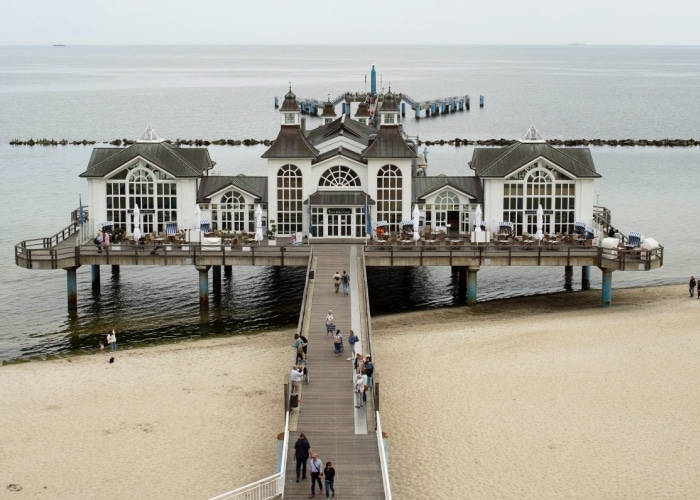
Close to the Baltic, Rügen Island stretches like a ribbon of white cliffs, draped in beech trees that slope down toward the water. In the Jasmund National Park, the trail brushes the chalk cliffs, crunching underfoot, while eyes lift to the Königsstuhl as mist drifts over the sea. A simple, almost silent landscape that stays with you.
Further south, the villas of Binz line up their wooden balconies, slightly old-fashioned, charming when evening falls. At Sellin, the pier reaches out into shifting blues, a few steps and you find yourself at the end, facing the wind, saying little. Flat sea, salty air, time slows down.
Northern Germany reveals itself best up on the cliffs of Cape Arkona—lighthouse beams, bending grasses. A path leads to the hamlet of Vitt, a few boats, the scent of smoked fish, a bench to gaze at the horizon. You wander back toward Sassnitz, one last glance behind you, the image lingers long after.
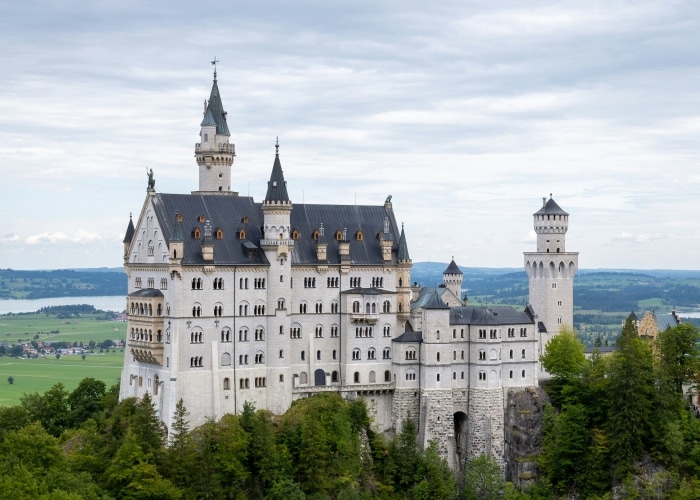
At the foot of the Bavarian Alps, Neuschwanstein Castle rises behind the pines, almost unreal. Its towers soar above the valley, and the contrast with the meadows of the village of Hohenschwangau gives the place a unique atmosphere. Crossing Marienbrücke, with the gorge below, your gaze lingers without effort.
Descending toward Füssen, the cobbled streets bring you back to something simpler—colorful facades, café terraces, an easy pace. It’s a pleasure to pause along the shores of Lake Forggensee, a calm expanse of water reflecting the mountains, sometimes broken by a sailboat gliding through the silence.
All around, hiking trails stretch out, sometimes steep, sometimes gentle. The Hohenschwangau Castle, more modest, keeps watch over the valley, reminding you that history isn’t only made of stone dreams but of real lives too. As you leave, the image of Neuschwanstein lingers, like a memory slightly blurred.
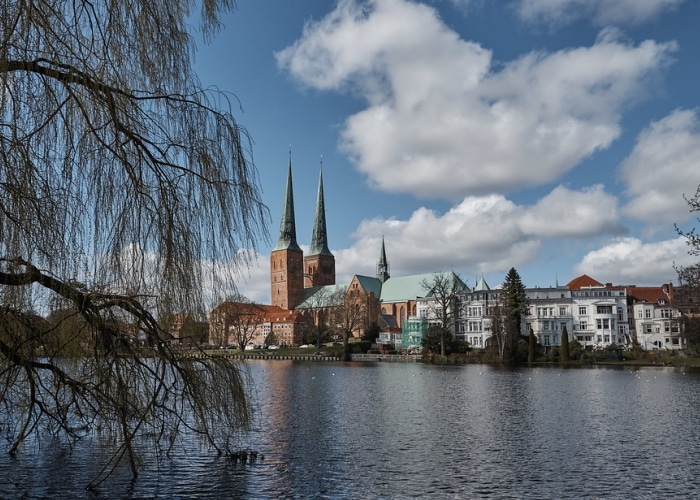
As you near the Baltic Sea, Lübeck reveals its red bricks and slender spires. The Holstentor gate still guards the entrance, massive, slightly somber, a witness to centuries past. Beyond it, narrow lanes lead toward the Marienkirche, where broken bells rest on the ground, silent yet eloquent.
Along the Trave River, old warehouses recall the days of the Hanseatic League. You stroll unhurried, past leaning facades and uneven windows, and sometimes a hidden courtyard opens like a secret world. Evening light slips across the brick, warm, almost gentle.
Not far away, the Buddenbrookhaus tells another story, that of writers and the bourgeois life of long ago. You linger there before heading to Travemünde, the Baltic port where the air smells of salt and white sails drift toward the sea.
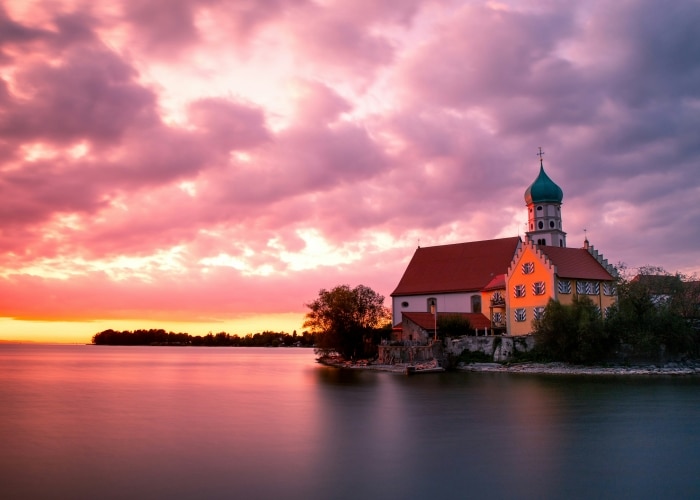
At the meeting point of Germany, Switzerland, and Austria, the Lake Constance breathes slowly. Smooth water. Hills, orchards, scattered rooftops trembling in the reflections. Nothing feels rushed here.
Not to be missed:
– The island of Reichenau, laid out like an open book, known for its Benedictine abbey and centuries-old vegetable gardens.
– Meersburg, perched among its vineyards, with a castle gazing out toward the lake.
– Mainau, the flower island, lush and exuberant. Palms, sequoias, butterflies drifting in the warm air.
– Lindau, calm, surrounded by water, its lighthouse standing tall, its harbor alive, like a slightly faded postcard.
– And Constance, or Bodensee, a town with Roman roots, where water lingers gently against stone.
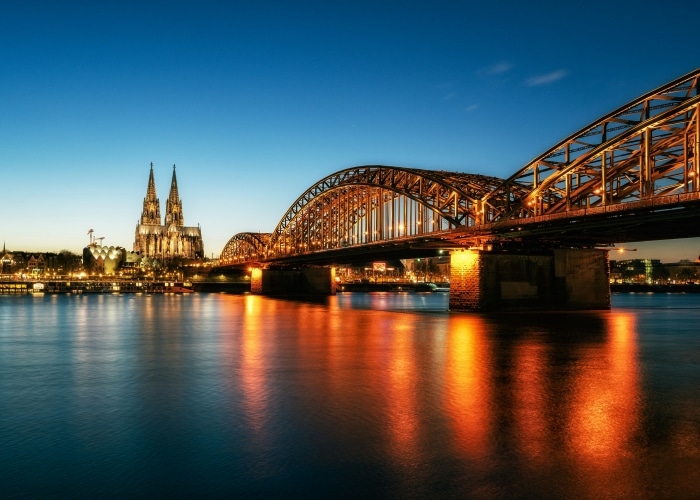
At first glance, Cologne is defined by its cathedral towering over the city, dark and dizzying. The spires of the Kölner Dom draw the eye from every angle, and once you step inside, the space suddenly expands, almost overwhelming. The Rhine flows just a few steps away, broad and steady, like a calm breath.
In the old town, narrow houses with colorful facades line the squares, and Alter Markt is the perfect spot to pause and soak up the easygoing atmosphere of a summer evening. A little further on, the Museum Ludwig surprises with its modern works, a sharp contrast to the nearby Gothic stones. You shift from one world to another without warning.
Across the river, the KölnTriangle offers a sweeping view—rails, bridges, and the cathedral at the center as a fixed point. By evening, the lights glow softly, reflecting on the water, silhouettes moving along the quays. Cologne remains vibrant, always bound to its river.
Berlin
German
357,022 km²
October 3
83 million
Euro (EUR)
CET (UTC+1)
Temperate
+49
230 V, Type C & F